



- 7/16
- 7/24
- 7/31
- 8/8
- 8/20
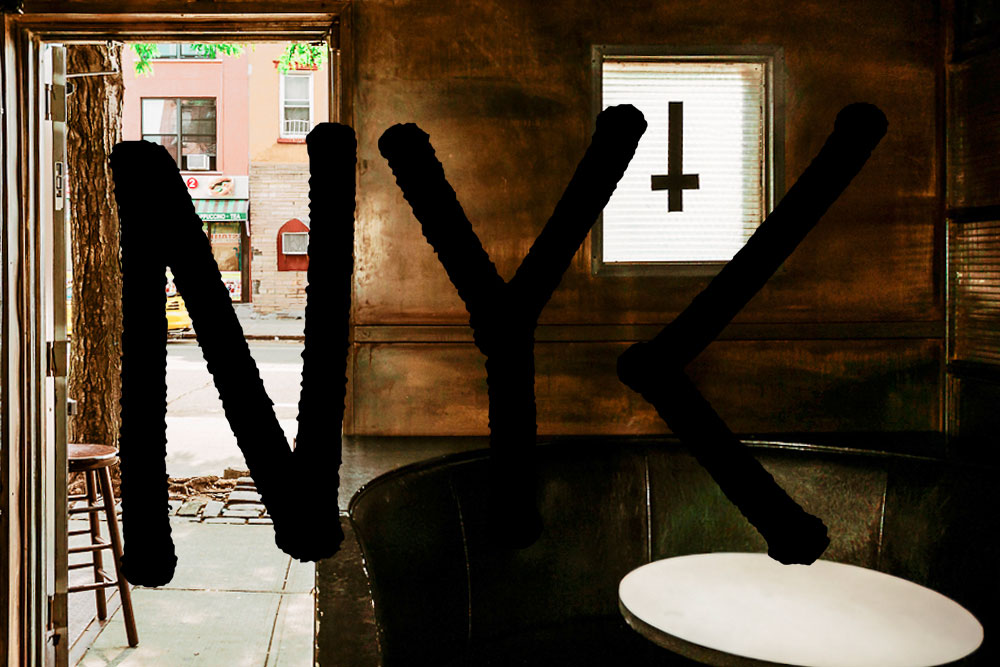
Photos by Samantha Marble
Saint Vitus Bar opened in the Greenpoint section of Brooklyn in the spring of 2011. I booked one of the first shows there with Liturgy, Lichens, White Ring, and a solo set from Terence Hannum of Locrian. It was an intentionally diverse bill that made it clear that this would not be your typical metal venue. I’ve booked a number of bands there since-- including Converge, Deafheaven, Iceage, and Pinkish Black-- because if you’re into loud music, and you live in New York, it’s where you want to go to see a show. I live in the neighborhood, within walking distance, so it feels especially local.
When I started thinking about the idea of New York City as scene, I came at it in terms of a central meeting ground. Saint Vitus has that feel, much like CBGB did during its more important years, or ABC No Rio and Coney Island High did for other generations. (My favorite parts of the essential punk oral history Please Kill Me are when the bands talk about the venues that housed them.) So, instead of interviewing dozens of bands-- who would probably tell me in one way or another that there is no real codified metal scene in NYC-- I wanted to talk to the guys who run the place where all these bands play. It’s the first club that’s meant a lot to me since I was a teenager trekking out to Maxwell's to watch Fugazi over and over.
On a recent Friday afternoon, I sat in the backyard of a seafood shack with two of the bar’s founders, Arthur “Arty” Shepherd (ex-Mind Over Matter, Gay for Johnny Depp, Primitive Weapons, etc.) and George Souleidis (Polygamist), along with event director David Castillo (Primitive Weapons, White Widows Pact), to discuss Saint Vitus and the scene around it.
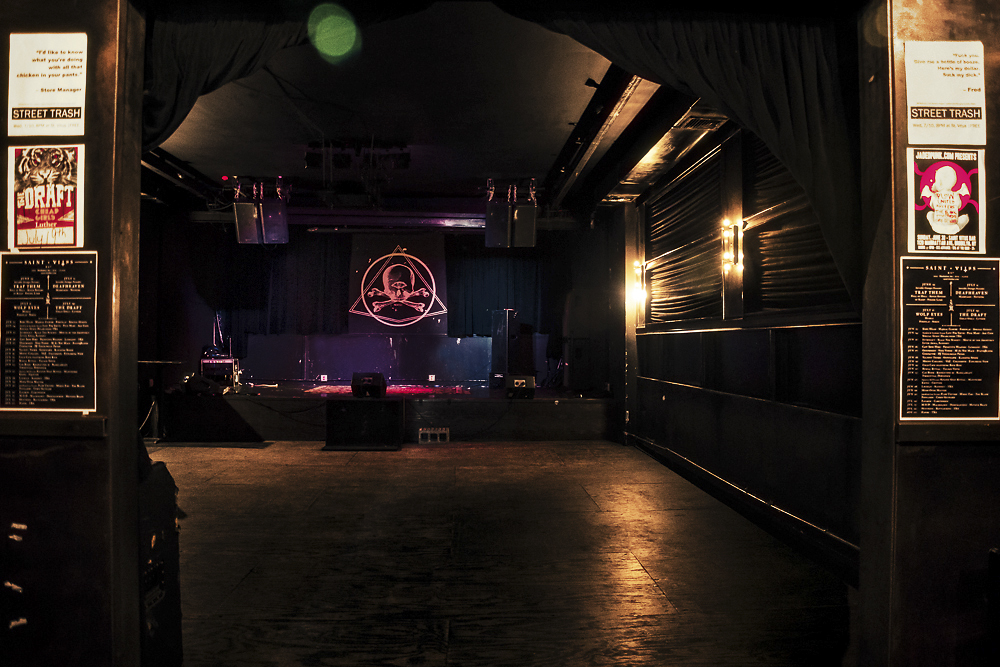
Pitchfork: How did you guys decide to start Saint Vitus?
Arthur Shepherd: George and I worked together at [Williamsburg's] Bar Matchless for years and neither of us even knew the other’s last name, it was really weird. But we were friendly with each other. One day, I was fucking around and put on Yngwie Malmsteen, and we both looked at each other because we knew every word and every lick. It was like, "Holy shit, you like metal?"
George Souleidis: We air-guitared every note of the solo.
AS: A wall came down and we just went from there. At Matchless we would get in trouble if we played metal, so we'd wait until the boss left and then play it. We saw trends starting to change, and people started coming around to it. Metal wasn’t such a dirty word anymore.
When the opportunity for Vitus came, we had this space and we were like, "We can do so much with this." I fucking hate booking shows, and George didn't really wanna deal with it either, so we hired Dave. That was a leap of faith, but I had a lot of faith in Dave. At first we weren't gonna do a lot of shows because it's a big hassle, plus neighbors and shit.
David Castillo: It's one of those things where you open anything and you need to see why and how people want to use it. Are you like Motor City or are you more like Coney Island High? There are a lot of things on the scale. So at first it was really like: "Let's do some good shows, but let's also see where the bar and people take it."
AS: The first three months were really busy, but we felt like this was the direction we wanted to go in, and the room sounded incredible. It was one of those things that you had to experience. I remember the first time we built the stage, I had just gotten home from tour in England and I walked onto it and was like, "This fucking rules, I want to play here."
DC: Conceptually, it's so easy to understand: These guys are from New York, I'm from New York. I'm a little bit younger than they are, but it was like, "There's no real cool New York rock club, what happened to that?" As the place continued, you saw that this could be that place. We could go there.
AS: After the first year we saw the potential. We were having people writing about us on an emotional level about what the place meant to them. We saw people enjoying themselves. That was something that we treasured because we worked so hard to make it a comfortable experience for everybody. We try and keep ticket and drink prices low, try and make it a full experience for everybody, and now, after two-some-odd years, it's really become an animal of its own. I want everybody who comes through to play. Dave's had incredible taste, he'd has incredible foresight into seeing stuff. I've used my connections with people that I'm friends with that literally won't play anywhere else but Vitus because they just walk in there and are like, "I have to play here," even though they're a way bigger band. We all play a role. It's a good team.
GS: The place itself became a homebase. There was a void in the scene. It's bigger than all of us. Another thing, is that we all have band backgrounds, so we're very sympathetic to the bands. We definitely love to take care of them.
DC: I do... to a point. [laughs] Take the European rider to Europe!
AS: Yeah, exactly. When people give us attitude I'm the most sensitive to it, and Dave is the most defensive about it. We honestly give so much, for somebody to complain about these little things... But it's never the bands, it's the booking agent, it's the management, and then the band shows up and they're happier than a pig in shit. They're like, "This place is great." We go through all this stress and it has nothing to do with the band, the band doesn't give a shit. Maybe they're bitching and moaning to their manager and their booking agent, but when they show up they have a good experience, and we make sure that that happens.
I know what I want when I play a show. I've been treated like a shithead at shows I've brought 600 people to. It's like, "Really, I can't get an extra case of beer?" Venues in England are notorious for this. It would be amazing to me, like, "I just sold out your club in London and I'm at the bar buying beer."
Pitchfork: I used to do metal shows at Public Assembly, under the old owners. They had me do it Sunday night, because that was when they had nothing else. They wouldn't give the bands free drinks. At Saint Vitus, metal’s treated with respect. At some other spaces, you feel like you’re plugging in a date on the calendar.
DC: Another reason why I wanted to be a big part of Vitus is that there were just so many people who would give their Saturday night to it in a heartbeat if somebody rad’s playing. I wanted a place that I can really be with it; just come here, be a part of it, and just hang.
GS: The shows become events. There's no other place where you can go see Pentagram and then there he is at the merch table signing t-shirts. There’s an intimacy. Most bands that play here hang out all night.
DC: From a fan's point of view, that's the most important.
AS: Wino's a good example. Wino's played here five times, and he's always upstairs hanging out.
GS: He's the coolest-looking guy on the planet.
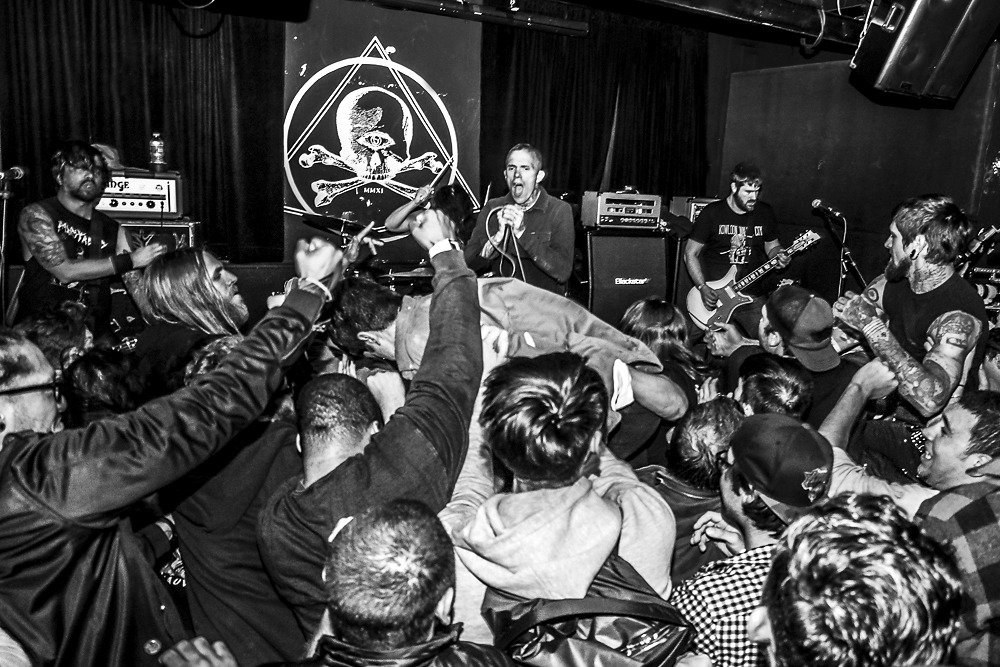
Pitchfork: When we did the Converge show, those guys never once asked about money. They were just sort of like, "Yeah, we just wanna come play."
DC: Yeah! And it was basically because I honestly felt they just wanted to do it. It was so fucking cool. That's the ultimate respect. For my age group, my timeframe, Converge is the biggest shit in the world. When Jane Doe came out, it was so seismic. It was just like: Boom, this is the new agenda in hardcore. And the fact that they just wanted to go and do this because they needed a tune-up show for Maryland Deathfest, that's awesome! They wanted to do it here. By the way, Ben Koller does a great "Hunger Strike" with Steve Brodsky in karaoke, in case anybody’s wondering. That's a good afterhours hang for anybody that wants to come down to the club.
Pitchfork: Back in the day, there would be certain promoters who would book 12 death metal bands and start really late at night and have these crazy fliers with 75 sponsors on the bottom who never actually did anything. I feel like that was a certain era of metal in New York, and this feels a little bit different.
AS: As a kid back in the day, I used to feel bad for promoters because I was involved heavily with booking shows on Long Island, shows that became fucking legendary. We gave everything to the bands, maybe too much, because we had gotten back from touring in Europe and we were like, “Oh, this is how you do it.” Of course, we didn't realize that the clubs we were playing in Europe were subsidized by the government and that's who was basically paying us-- the taxpayers. But what we felt was that you take care of the bands. Maybe in a situation like you're talking about, the promoter wasn't taking care of the bands. And there's always the sketchy promoter thing that goes on, and that's why you have tour managers, so they can, like in Spinal Tap, bring your cricket bat...
DC: Anytime there's money involved...
AS: Even miniscule amounts of money. The thing is, the club is making money off of liquor. Even if we eat $100 or $200, we want the band to be good. We have the foresight to see down the road that there might be something better that is gonna come from all this. We've paid bands way too much and then made shit. We put our time in. We eat it.
GS: But those are few and far between, honestly.
DC: People are idiots sometimes. Small accoutrements that most bands really need are never gonna make or break your business. In the history of bars, will $100 fuck you up? If you understand that the lifeblood of what you are doing is music, you should invest into the artist. That's never really been something that was done with heavier, darker, more obscure sorts of music because it was always fragmented. Now it's coalescing into new and really interesting things. Now there's a legitimacy to it, which is really cool. Like, if you're some indie band and you go and play Mercury Lounge, they'll try and build you up and then take you to a Bowery Ballroom level. Building bands is good business, and if you realize that you're a place where you can percolate those things, that's amazing.
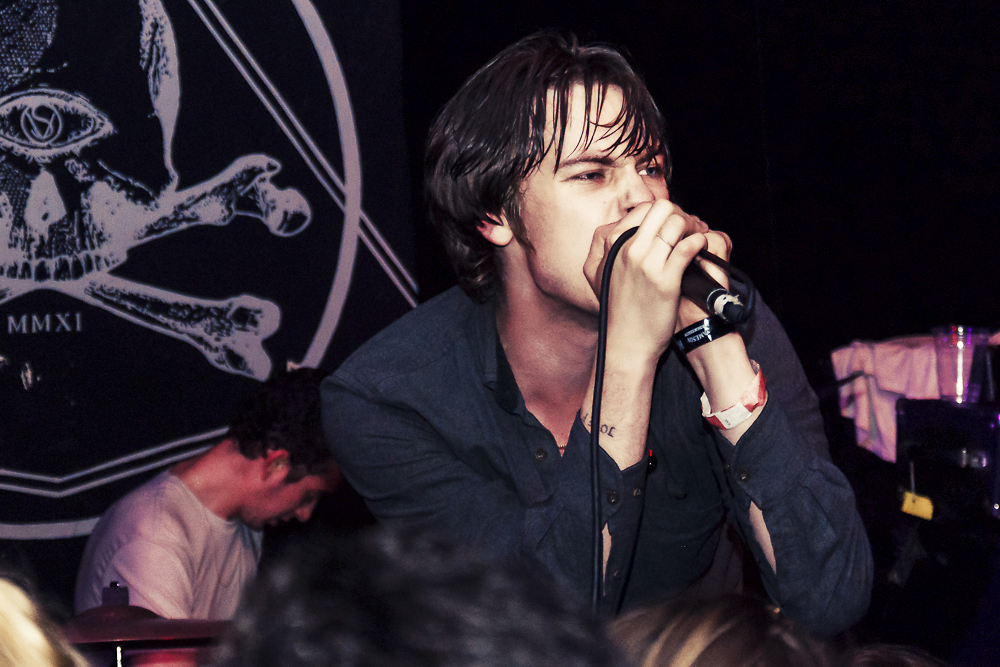
Pitchfork: You're a metal bar, but you do some shows that aren't metal.
AS: You can't just stay like that. It's pointless. I'm 40 years old. I have three favorite genres of music: metal, early 70s prog rock, and early 90s English shoegaze. I like everything. I've seen Phish 10 times, no joke.
DC: Ten times?
AS: Yeah.
DC: That sucks so bad.
AS: Late night when the doors locked, we're sitting there watching Pink Floyd's Live at Pompeii. This is what we do. Musical tastes have a wide-range. And plus, something like Merzbow brought a lot of people. We were able to do two shows. It was a Monday night. Why wouldn't we do that?
DC: If you think about the greatest clubs, your CBs, your Coney Island Highs, your L'Amours, they'll be known for hardcore and punk, or for whatever, but if you really go back and look at it, there's all sorts of shit happening. I have a pretty eclectic taste in music, but I wanted it to all be under the same banner: There's not too much sunny shit coming through our doors. So all these different things like Merzbow, Chelsea Wolfe, Vector, and Cult of Youth make sense.
AS: Even Marissa Nadler made sense.
DC: All of these things can play in the same sandbox and it's not totally insane.
AS: The internet made it that way, honestly.
DC: Yeah! People are moving into this dark, harsh, interesting center.
AS: It changes as you get older. When I was young, it was all hardcore-- I just fucking knew everything.
GS: When I was that age I was all Touch and Go. I was a total label freak. Anything Killdozer did or Jesus Lizard did. I could listen to nothing else. There's one thing you really identify with and you kind of unravel.
DC: But the paradigm is changing now.
AS: I think it started with the whole iPod shuffle generation. That whole idea of listening to stuff and not knowing what you're hearing. Then you hear stuff like crabcore and it literally sounds like six different songs in one song. I feel that's what kids who were 13, 14 years old listened to and now they're like 17, 18 and writing this crap. I just wanna throw the Beatles catalog at them and be like, "Just fucking listen to music, asshole. Learn the basics before you do this." They're not wrong. They're just not exposed. But it's grown since then. And now everybody listens to music on Spotify and that's gonna change things as well.
DC: In terms of our scenes, it's become very acceptable to listen to certain bands and genres that are different than the core thing.
AS: You see new little crust kids with the Joy Division shirts on, which I find really interesting. And then they get all ripped up about Boyd Rice. It's like: "Hey, guys, do you realize what Joy Division is?" [laughs]
DC: But it's also unpacking artistic intention versus who a person is. It's really hard to do that. I don't think that those conversations will continue to keep going on in general. I think a lot of people let a lot of things pass by them because it's supposedly normal-- that to me is totally fucking crazy. And then somebody will get really riled up about something that I think is so minute. It's really wild.
AS: Unfortunately the internet gives people platforms to be equal in their opinions about things and it can be really unfortunate that somebody who's a total moron can be up there with somebody who's really smart. It just gets to a point where it's all convoluted. Just look at the comments on Brooklyn Vegan.
DC: At the end of the day, running a venue, I wanna give platforms to people with something to say, and ideas that are out of the norm. I wanna take it there. The only reason we talk about CB's or L'Amour's or any of these places when we're talking about that stuff is because they were there and available for people to actually do that with. Through that, there's probably gonna be some things that aren't savory to a lot of folks. Maybe that's also the point. I try to be really strong in the evaluations, and we've argued amongst ourselves. I mean, it's difficult, man. But at the same time, I wouldn't wanna push away from that standard because I think that's really important. There's enough places where you can't say what you want and where censorship lives.
AS: I can't back that shit. No way. I grew up going to ABC from the time I was 17. I felt like those crust punks were just as bad as any fucking Nazi, honestly, in the way that they were like, "Yeah, well, you're not allowed to do this. You're not allowed to do that." It's like, "Fuck you! I'll do anything I fucking want." I've had my life threatened by Nazis numerous times. I'm from Long Island. I lived in fucking fear of leaving my house for fucking six months at one point in my life because I opened my mouth. It's all repressive. I'm all about listening to music and enjoying music for what it is. Peace, love, and the Beatles. Amen.
DC: That's the key. Vitus, to me, is life-affirming. I love going there. When it all comes together, it's fucking sick, and you see it. The craziest thing was that Descendents show, honestly. It was such a mess.
GS: We lost a couple years of ours lives on that one.
DC: But I remember being in there and the whole thing is just a fucking zoo. But I'm just sitting there by the bathroom and I just stopped for a second and watched them play for like one song, "I'm the One". It was so nuts, but everyone was having such a good time. So many people were just so fucking stoked.
AS: They were having the night of their life. It was awesome.
Pitchfork: Their show was cancelled somewhere else?
DC: Yeah. They Tweeted it out. All of a sudden, I was in a cab on my way home and my phone just started shaking like a fucking maraca. I just got all these messages at once. And I'm like, "What the fuck is going on?" I thought something really bad happened. And all I saw was, "Is it true? Is it happening?" And I was like, "What the hell is anybody talking about?"
AS: He texted me and I was like, "The Descendents are playing."
DC: So I walk upstairs, I look at my wife, and I'm like, "I can't go to dinner tonight." She looked at me with the ferocity of a fucking cheetah protecting her cubs. She was gonna fucking kill me. And then I go, "The Descendents are playing Saint Vitus." And she's like, "You gotta get in a car right now!" It was like all was forgiven in [snaps] this fucking instant.
AS: A thousand people showed up!
DC: It was fucking wild.
Pitchfork: What’s been your favorite show at the bar so far?
DC: Whew. The first YOB show was really amazing, to me. It was the first show that we really did with this jacked-up sound.
GS: It was probably one of the best sounding shows we've ever had. The crowd knew it, too! People came out just saying, "I've never heard this band sound so good ever."
DC: A lesser known moment was when Anatomy of Habit played there for the first time, it was so bizarre in the way that they ended their set with just this crazy pounding doom metal riff and this dude with this thick chain just slamming against this metal in unison with it. It was the weirdest, heaviest, fucked-up, awesome thing. That was early on, and I was like, "OK, this is some shit you should see in New York City."
GS: As far as my favorite moment, I once had to work 10 nights in a row at the bar, and it's 12 hours of pummeling music and darkness a day. It was a mild form of torture. Love metal all you want, but by day eight, you're like, "OK. Where's the rope? Just give me some Barry Manilow." But that Sunday was the last day of the 10-day stint and this pretty much unknown band Vector was playing. The last thing I wanted to hear was loud music, let alone be there. But it was just one of those surreal moments for me.
I grew up in Brooklyn. I grew up in L'Amour's. Grew up in Limelight. I had certain ideas of what Saint Vitus should be like. The sweet spot I have for that kind of club and venue. And these guys hit the stage and they looked-- I thought I was watching Overkill in '87. They had that look and their sound and they played effortlessly. It was like they could do sci-fi thrash on steroids. I remember George Paul from Mutilation Rites was there with me and he just kept coming out of the live room and saying, "I quit playing guitar. I'm not playing guitar anymore." Here were a bunch of young kids with a new shot in the arm for thrash. I thought they were the best thing since sliced bread.
AS: They're so fucking good.
GS: Sliced metal.
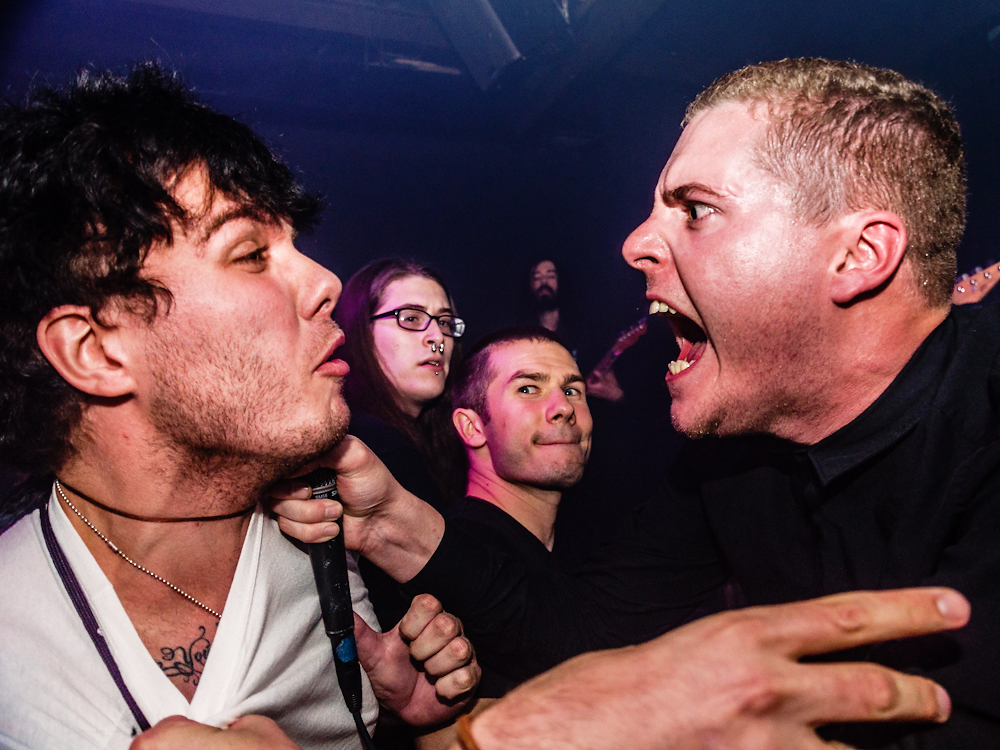
Pitchfork: You guys have been involved in the scene for a long time, growing up being into metal or loud music. How do you think things have changed in New York since you were teenagers?
GS: More wars [laughs] But in the end, it's the death of club culture. When Giuliani started closing all those clubs that were supporting a lot of that outside-the-box music and then he cleaned up Times Square and everything, all the clubs we grew up in closed.
DC: Coney Island High is a Japanese restaurant and condos. It's sad, but true. Manhattan isn't really a place to play music on a smaller scale anymore.
GS: The kids need somewhere to play first and then work their way up.
AS: There were no rules back then. Nowadays, the competition is so much heavier to sell alcohol, and the rents are up. All those old places owned the buildings or they had leases for 25 years. They were able to get away with a lot more. Whereas nowadays, a club has to be either very specific like we are or you have to be really creative because the competition is insane. When we first started, there weren't a lot of places doing shows. Now everybody does shows! Because they have to. It's the only way that they can get people in. They realize that even if the band just brings six friends each, at least that's 30 people in the building. Each of those people has two drinks. You do the math.
And a huge difference is the freedom is gone, especially in these neighborhoods.
GS: A bar can't even have a backyard without the cops shutting them down in five minutes, let alone have them play loud music in a place.
AS: Yeah, the Bloomberg Gestapo is fucking... you can't even ride through a red light on your fucking bike.
GS: It's pretty terrible.
DC: At least for my generation and forward, it's not about living in the suburbs. It's about being out here, but unfortunately, there are certain folks trying to turn it into that and that sucks. That's why we're looking at the end of Manhattan.
AS: When we did shows on Long Island the end result was if you did all ages shows, you couldn't make any money because you couldn't sell alcohol. There's always something. They don't want people to congregate. It's the same shit. It's the same thing as public houses creating revolutions back in the 1700s. They don't want that! They don't want you to have new ideas. They will keep you down anyway they can, so we take what we can with Vitus and we hope that like-minded people come in. Even normal people, I fucking love that. I love when you could see the person that read The New York Times reviews and came in. They're kinda looking around. They feel uncomfortable, and George makes them feel like they're the fucking king of the world within seconds and it's great!
DC: I think a lot of people fucking forget what it's like to get into something: Listen, fucking asshole, you didn't grow up just thinking that you came out of the womb and fucking Burzum and Joy Division were your favorite bands. Get the fuck out of here!
I don't care if you listen to a Metallica song once in your life and you just wanna understand something-- that curiosity is fucking great! That's the only way that things are gonna get bigger and improve. I really despise any sort of elitism. I mean, there are certain parts of heavy metal culture and the scene that I don't really particularly like. I was a Colombian hardcore kid from Long Island and NSBM does not appeal to me. But at the same time, that doesn't really matter to me. I just want it to be like: "Hey, dip your toe in the pool, and if it feels good, jump in, and it'll be fucking awesome."
AS: If years from now people can say something like, "One of the coolest shows I went to was when I was 21 at Vitus... " that would be amazing.
GS: Our greatest joy is just seeing the appreciation of what we're doing-- seeing a couple from Moscow say, "You're the first place on our list to visit."
AS: The European thing is crazy.
Pitchfork: Were you guys written up in some European travel guide?
AS: I guess so. I don't know. We're probably online. We only know they come when it's slow! When it's busy we have no idea they're there. I'm sure they are, but when it's slow that's when you actually get to talk to 'em.
DC: It makes it rewarding.
AS: "This is the greatest metal bar in the world." It's like, "Well, it's a little slow tonight, but have a beer!" Then they get drunk and they're like, "Could you play Darkthrone?" I'm like, "Why? No! I don't wanna play Darkthrone. Listen to Unsane. It's the best fucking drinking music in the world." "Shut up!"
DC: Everybody likes a little bit of harmonica.
Pitchfork: You guys are located a bit off the beaten path and you’re not very close to the subway. Is this good or bad for the bar?
AS: We knew we were a destination from the get-go and that was the idea, so we had to offer something to bring people as a destination.
DC: But then we could also be what we wanted to a little bit more.
AS: And once we had a Tony Iommi in the building, we realized we could do fucking anything.
GS: And Geezer Butler!
DC: Two! Two out of four on the Rushmore.
AS: In two years!
DC: Dude, we wanna put a Mount Rushmore behind the bar and have the faces filled in for Geezer and Tony and then have question marks for Bill and Ozzy. Bill ain't doing much!
AS: We could fill it in with someone and Zach Galifianakis. [laughs]
GS: Actually, I was talking to Jimmy Hubbard and he brought up Phil Anselmo and he was like, "Yeah, I was hanging out with Phil last week. He asked about the bar."
AS: He remembers being there? Get the fuck out of here!
GS: As a reference he was like, "That place was cool."
AS: I figured he didn't even know he was in New York!
DC: Hey, Phil, talk to me at Housecore. I've got big plans for you, buddy.
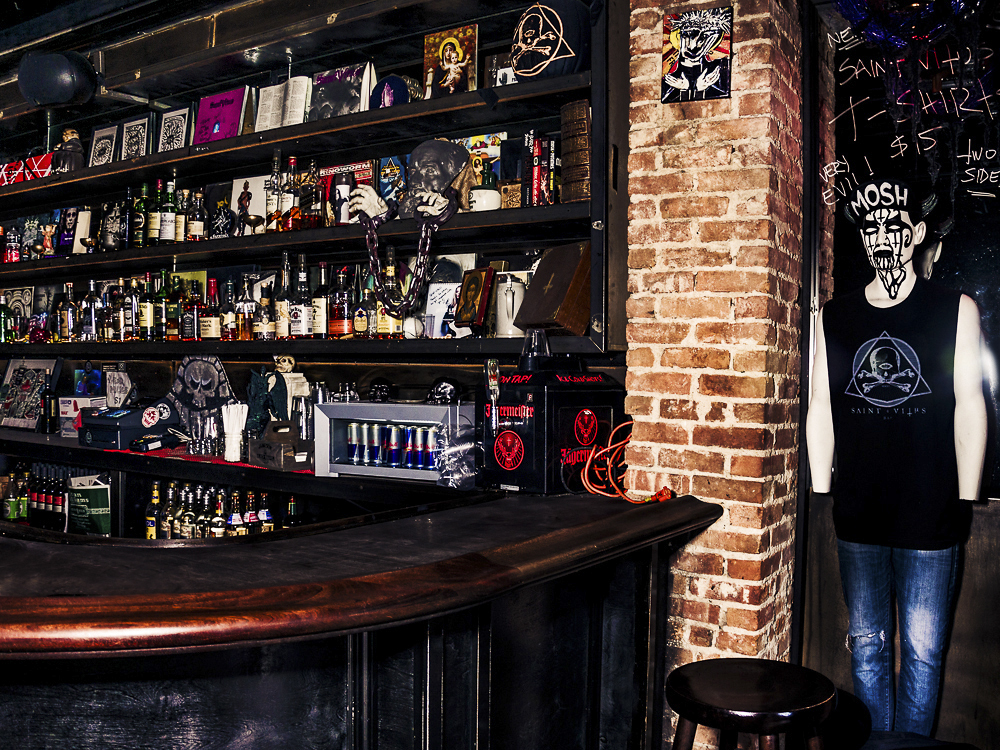
Pitchfork: A co-worker of mine came out to the Iceage show and he was like, "This place is really nice. I was kind of expecting a dive." When you designed it was the intention to make it is slightly nicer than your standard bar.
AS: We were very specific about what the bar should look like and the fact that it needs to be black. The whole place needs to be black.
DC: Even the toilets.
AS: Everything. And the vestibule where you walk in, that was George's idea: no storefront, no sign, you walk through the vestibule, turn, and it people-feeds to the middle of the bar. So you walk in and it's all dark and then you're like, "Whoa. Holy shit. What the hell is this?"
DC: From outside it looks like you're gonna die. And then the backroom's even bigger.
AS: But yeah, it was a lot of black paint.
DC: My feeling was that you could put this culture in here with a different sort of vibe and maturity. It didn't have to be real schlocky. I thought, “If we play our cards right, we can make this fun but also sexy and cool.”
GS: You used the word sexy a lot.
AS: The word sexy got thrown around a lot. Always. Everything is sexy. But, seriously, in New York, the space dictates your business.
DC: When I first saw it, I was like, "Dude, this could be Mercury Lounge." There weren't even bathrooms in there! There was nothing. And I was like, "Hey, do you guys wanna do shows here? This could be cool."
GS: We were both like, "No! Maybe like three a month." And then when it's like, "Oh, we've got rent to pay. Let's do it to 12."
DC: Everything just revealed itself. It wasn't super planned, like, "Hey, we're gonna open up this fucking venue."
AS: I love that comment that people think it looks nice. We've tried our best to keep it that way. It's very difficult. Granted, the lights are so low that you wouldn't know the fucking difference. For a while we kept the graffiti out of the bathrooms. But they got really cumbersome and then people started finding ways around it where they etch into the glass and they do all this other shit. I fucking hate people who do graffiti. You're all a bunch of fucking children!
GS: I think most people that visit, though, are respectful of the place because we did put a lot of ourselves in it. It's for the scene.
DC: Even the way that people just behave in the space while they watch shows and stuff, they definitely look out for each other. It can get pretty rowdy in there, but overall we've had really good experiences with it. And obviously, we have security. We have presence. I've definitely seen people being like, "Dude, don't do that shit here, that's too much."
GS: They want us to keep our doors open.
DC: We've had a lot of stuff that people have been like, "Holy shit." And we manage to always pull it off. Sometimes it sucks. Sometimes it's cool. But overall, it's cool. I think it's because people want it to continue. I think it's really amazing what can happen when you don't go for the lowest common denominator all the time.
AS: If there's a day without a show, we're not gonna book something that's crap just to have something. It's quantitative and that's the bottom line. I don't want people to walk in and be like, "What is this crap? It's loud. It sucks." I want them to always have a good time. It's hard! It doesn't always work out that way.
DC: At the same time, I think that people see the level continuing to rise, but I also think that the bands around here and just the overall level of the whole thing is continuing to rise, too. That's what's fucking awesome, too. And that's what we're hoping continues to happen.
Pitchfork: People say that certain cities have a sound, but New York doesn't really have a sound.
AS: Not anymore. Swans to me are the ultimate fucking New York band because it's just miserable. They're the soundtrack for not being able to pay your rent. [laughs]
DC: Struggle. Yeah, absolutely. At this point, everybody is looking at a lot of different sort of music and putting emphasis on that.
AS: That doesn't mean that rap and rock can combine again, though.
DC: Yeah, no. Keep that separate. But I do think that the tone of it is all pretty dark. I look at bands like Hull, Clean Teeth, Batillus, Sannhet, and they're all heavy as fuck, but very different in their approaches. All these bands play together, though, and I think that's actually cool. We're all kind of going up a road together, but we're not doing it the same way, like, I'm in a different car.
AS: But we all get out of the car and go to the same place.
DC: And then you bring like 150 bucks and spend it at the bar!
AS: Then you can't pay your rent and then you make a band that sounds like Swans! Just don't start doing heroin!
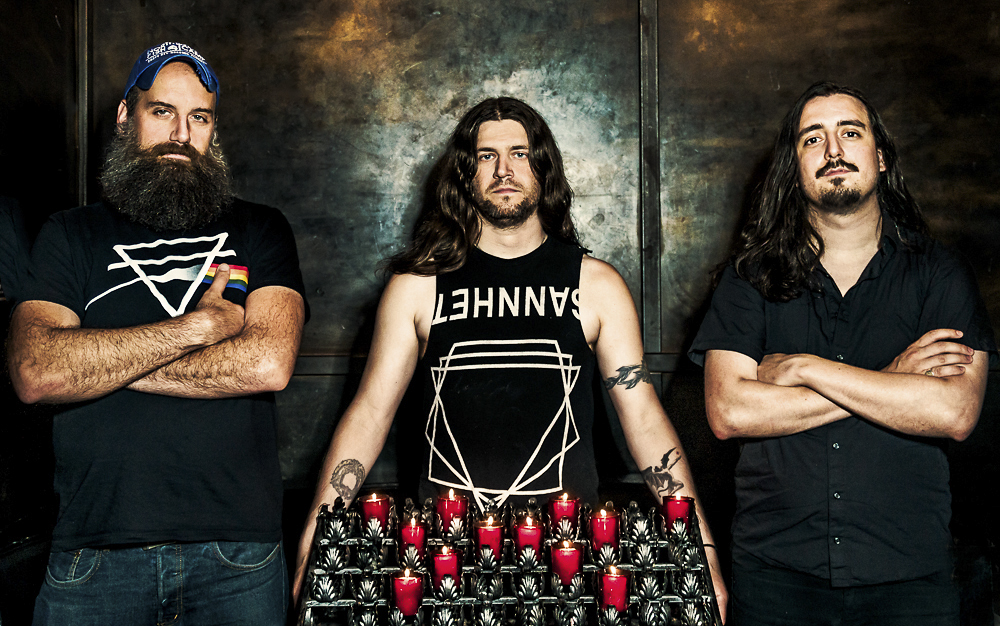
St Vitus Top 20 Records
[in no order]
- Quicksand: Slip
- Type O Negative: Bloody Kisses
- Born Against: Nine Patriotic Hymns for Children
- Riot: Thunder Steel
- Swans: The Great Annihilator
- Winter: Into Darkness
- Anthrax: Among the Living
- White Lion: Fight to Survive
- Helmet: Meantime
- Suffocation: Effigy of the Forgotten
- Unsane: Scattered, Smothered & Covered
- Mind Over Matter: Automanipulation
- Gorilla Biscuits: Start Today
- Cities: Annhilation Absolute
- Nuclear Assault: Game Over
- Burn 7"
- Leeway: Born to Expire
- Cro-Mags: Age of Quarrel
- Rorschach: Protestant
- Crumbsuckers: Life of Dreams








